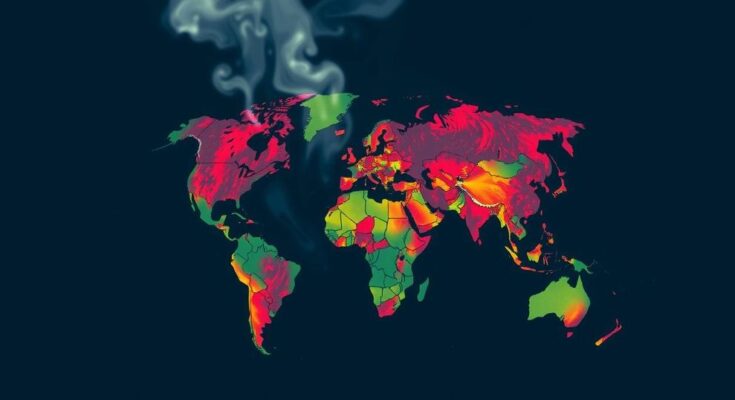A new report by The Lancet Countdown indicates that climate change is leading to unprecedented health threats worldwide, including increased temperatures, rising mortality rates, and expanded food insecurity linked to extreme weather. Health experts urge a reallocation of trillions spent on fossil fuels to protect health and promote renewable energy, emphasizing that climate change is fundamentally a public health issue.
A recent report by global health experts has issued a grave warning regarding the escalating health threats posed by climate change, noting alarming increases in temperatures, mortality rates, and the proliferation of infectious diseases related to this global crisis. Published by The Lancet Countdown, the report highlights that populations across every nation are now confronted with unprecedented health risks due to the rapidly changing climate. Conducted by a coalition of 122 leading experts, the report reveals that heat-related fatalities, food insecurity, and the emergence of climate-driven diseases have reached historical highs. Dr. Marina Romanello, the executive director of the report from University College London, emphasizes the urgency of the situation, stating that “once again, last year broke climate change records, with extreme heatwaves, deadly weather events, and devastating wildfires affecting people around the world.” Dr. Romanello reiterates that climate change is not merely an environmental concern but a fundamental health issue, stating that every individual and economy is susceptible to its impacts. The data indicates a notable increase in mortality among vulnerable populations, particularly those aged over 65, due to exposure to extreme heat. Additionally, the report outlines that record-high temperatures have constrained outdoor work capacities, thereby posing health risks for laborers. In the year 2023, the report notes, individuals experienced an extraordinary average of 50 additional days of temperatures posing health risks than would be expected in the absence of climate change. The authors assert that the occurrence of heatwaves and droughts has resulted in 151 million more individuals encountering moderate to severe food insecurity across 124 countries as of 2022. Dr. Romanello points out that “almost 50 percent of the global land area is now affected by extreme droughts,” linking this trend to severe health threats. The report specifically cites acute hunger crises exacerbated by drought conditions, as observed in Somalia. As countries prepare for the upcoming COP29 climate summit in November, the experts urge governments to refocus the trillions of dollars currently spent on fossil fuels, advocating for investments in health, livelihoods, and the transition to sustainable energy sources. Dr. Romanello strongly encourages the reallocation of resources toward bolstering health systems for vulnerable communities, stating, “there are resources that could be used to strengthen our health systems to support vulnerable communities. Those are resources that should not be going to perpetuating the use, the expansion of fossil fuels.” She asserts that these funds could effectively promote access to renewable energy for the over 700 billion individuals globally who currently lack it, thereby combating energy poverty. The authors contend that the report’s findings necessitate a global shift in financial systems, directing resources away from fossil fuel dependency toward a sustainable, zero-emissions future. Such a transition promises substantial health and economic benefits, including improved energy access, cleaner air and water, healthier diets, and more sustainable job opportunities.
The intersection of climate change and public health has become increasingly prominent in global discourse. Climate change not only affects environmental conditions but also has profound implications for human health. Rising temperatures, extreme weather events, and shifting disease patterns pose threats to health systems and increase mortality rates, particularly among vulnerable populations. As the world observes a continuous escalation in climate-related disasters, understanding these threats is crucial for formulating effective responses and policies. The Lancet Countdown is a vital platform that consolidates research from global health experts to inform policymakers and the public about the health impacts of climate change and advocate for necessary actions.
In summary, the recent report by The Lancet Countdown underscores the dire public health implications of climate change, revealing that extreme temperatures, food insecurity, and disease proliferation are at alarming levels globally. The call for governments to reallocate financial resources away from fossil fuel dependency toward public health and renewable energy solutions is urgent. By prioritizing health-centered investments, there is potential for significant improvements in health outcomes, economic stability, and environmental sustainability.
Original Source: www.africanews.com




